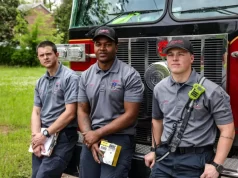
By Adam Pope
UAB News

In a continuing effort to serve the health care needs of medically underserved populations across Birmingham and the state of Alabama, the University of Alabama at Birmingham School of Nursing has long partnered with community agencies and facilities to identify and assist those who struggle most to receive proper health care by providing care through the school’s nurse-managed clinics.
Since 2013, one of those important endeavors has been the UAB School of Nursing Foundry Clinic at The Foundry Rescue Mission and Recovery Center in Bessemer, Alabama, a suburb of Birmingham.
More recently, the school and its nurse practitioners from The Foundry Medical Clinic have also partnered with Cooper Green Mercy Health Services and Aletheia House, one of Alabama’s largest providers of substance abuse treatment, substance abuse/HIV prevention, employment and housing to low-income individuals, to provide staffing and medical services at the Bessemer Neighborhood Health Center.
Now that partnership will be expanded with the selection of the Bessemer Neighborhood Health Center as a New Access Point (NAP) Federally Qualified Health Center by the Health Resources and Services Administration. The two-year, $1.4 million grant was one of 75 awarded nationally by HRSA and one of only four awarded in Alabama.
The purpose of the NAP funding is to improve the health of the nation’s underserved communities and vulnerable populations by increasing access to comprehensive, culturally competent, quality primary health care services, something that fits well with the school’s mission to provide primary and urgent care to populations that might otherwise have no access to such care.
“This is wonderful news, particularly for our area’s homeless population, as it is the primary focus of the New Access Point funding,” said Professor and Associate Dean for Clinical and Global Partnerships Cynthia S. Selleck, Ph.D. “Congratulations go to all the partners involved and to Chris Retan, CEO of Aletheia House, for his leadership in this effort.”
Aletheia House is a community-based organization that has been providing substance abuse treatment and prevention services to low-income individuals, and the communities in which they live, since 1972.
“We look forward to working with Aletheia House in an ever-closer capacity at the Bessemer Neighborhood Health Center as, ultimately, it will mean better care and increased access to care to the community,” said Melanie Baucom, CRNP, the school’s lead health care provider at both The Foundry and Bessemer Neighborhood Health Center clinics.
The UAB School of Nursing staff strives to provide total treatment to the patients it serves at both clinics. Baucom and other UAB School of Nursing-affiliated nurse practitioners provide a full range of services including blood pressure management, diabetes management and treatment of acute illnesses.
Patients also have access to lab facilities and can receive help in having prescriptions filled at local pharmacies. The partnerships with The Foundry and Aletheia House are two of several initiatives the school has undertaken in recent years to address the growing issue of lack of access to health care in many populations and regions across the state.
The UAB School of Nursing’s role in its nurse-managed clinic partnerships is vital because it provides competent, caring health care professionals who know the populations and the communities they serve.
“We are so excited about the partnership between the Aletheia House and the UAB School of Nursing because it has allowed us to bring experienced providers into the clinic who truly understand the needs of the patients,” Retan said. “If we had to work with another group that didn’t have this knowledge, they would not understand the needs of the kinds of populations we are serving and might not provide the outstanding care that the UAB School of Nursing does.”
Retan notes that, for Bessemer-area residents, having access to quality health care providers and facilities such as the Bessemer Neighborhood Health Clinic and The Foundry Clinic greatly increases the likelihood patients will seek and receive the care they need.
“If people with chronic conditions can’t get to where they need to be in a convenient way, they will often skip getting care and get sicker and end up needing more extensive care down the road,” Retan said. “This partnership allows us to provide the people in the greatest need access to comprehensive medical care, behavioral health care, transportation and case management. “The people who have the greatest barriers to health care are the ones who will benefit most from this partnership.”




